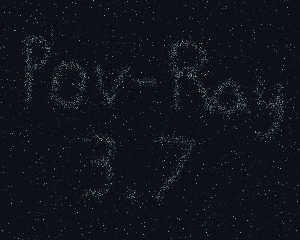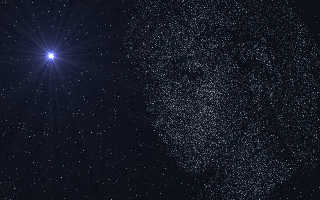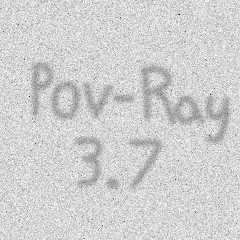 |
 |
|
 |
|
 |
|  |
|  |
|
 |
From: William F Pokorny
Subject: Example of Isosurface star fields.
Date: 20 Dec 2013 06:11:14
Message: <52b425d2@news.povray.org>
|
|
 |
|  |
|  |
|
 |
All, Thought I'd pass along another variation of Sam's silhouette image
to isosurface technique. This one showing how to make planar isosurface
like : abs(z*(1000/9))+Fnct00(x,y,z).grey-0.52. The value 9 sets a z
thickness of roughly 18/1000 for full black pixels and less thick for
grey moving to white. The images need to be relatively large. I've been
using 1000x1000 to 2500x2500 pixels.
Start with an image like blurExample.jpg (scaled down as posted for file
dotify command. With a GIMP pencil I wrote on another GIMP layer
to create the base star field with dotify then darken it slightly to
create areas of more stars.
The rendered example result (<30 seconds on i7-920) is shown in
StarFieldExample.jpg. Another variation can be seen in MadOfStars960.jpg
where the GIMP supernova effect was used post povray for the supernova.
The colors in the stars in the star field, of the blob-ish shapes, was
set with several colored lights variously positioned.
Funct00 is something like :
pigment{image_map {"blur.png" gamma 1.0 once map_type 0 interpolate 3 }}
If the opacity of the written layer is 100% the writing becomes solid,
rounded letters.
Have fun.
Bill P.
Post a reply to this message
Attachments:
Download 'starfieldexample.jpg' (188 KB)
Download 'madofstars960.jpg' (195 KB)
Download 'blurexample.jpg' (107 KB)
Preview of image 'starfieldexample.jpg'

Preview of image 'madofstars960.jpg'

Preview of image 'blurexample.jpg'

|
 |
|  |
|  |
|
 |
From: Thomas de Groot
Subject: Re: Example of Isosurface star fields.
Date: 20 Dec 2013 07:17:55
Message: <52b43573@news.povray.org>
|
|
 |
|  |
|  |
|
 |
That is fascinating indeed. Very worthwhile to try out.
Just for a reminder: what is the (exact) name of Sam's macro again? I
have so many macro's by Sam that I am lost (or I may have missed it, of
course). Thanks.
Thomas
Post a reply to this message
|
 |
|  |
|  |
|
 |
|
 |
|  |
|  |
|
 |
Am 20.12.2013 12:11, schrieb William F Pokorny:
> The rendered example result (<30 seconds on i7-920) is shown in
> StarFieldExample.jpg. Another variation can be seen in MadOfStars960.jpg
> where the GIMP supernova effect was used post povray for the supernova.
MadOfStars960.jpg looks absolutely /fantastic/!
Post a reply to this message
|
 |
|  |
|  |
|
 |
|
 |
|  |
|  |
|
 |
On 12/20/2013 07:17 AM, Thomas de Groot wrote:
> That is fascinating indeed. Very worthwhile to try out.
>
> Just for a reminder: what is the (exact) name of Sam's macro again? I
> have so many macro's by Sam that I am lost (or I may have missed it, of
> course). Thanks.
>
> Thomas
Thanks.
See p.bscene-files : "ToVolume: Object-To-Volume Conversion and
Rendering Process".
Note. With that include he provided an all POV-Ray canned process for
converting any object into a 3D isosurface using generated, stacked
blurred-image planes. I've been working mostly outside his include,
though using his blurred image technique via GIMP with just one plane,
one image, as the basis for various isosurfaces.
The blurred image technique at the core of his ToVolume include is a
remarkably flexible and easy way to "create" isosurfaces. It is
basically 2D image -> blur(1) -> save-image and render.
While I'd used images to deform isosurfaces, I did not get that 2D
images alone could define isosurfaces until I saw Sam was doing exactly
this (and more) in his ToVolume include.
Bill P.
(1) - The blur rounds, sets the 1-0 gradient and effectively sets the
max depth of any further isosurface surface deformation.
Post a reply to this message
|
 |
|  |
|  |
|
 |
|
 |
|  |
|  |
|
 |
On 12/20/2013 07:49 AM, clipka wrote:
> Am 20.12.2013 12:11, schrieb William F Pokorny:
>
>> The rendered example result (<30 seconds on i7-920) is shown in
>> StarFieldExample.jpg. Another variation can be seen in MadOfStars960.jpg
>> where the GIMP supernova effect was used post povray for the supernova.
>
> MadOfStars960.jpg looks absolutely /fantastic/!
>
Thank you.
Post a reply to this message
|
 |
|  |
|  |
|
 |
|
 |
|  |
|  |
|
 |
clipka <ano### [at] anonymous org> wrote:
> Am 20.12.2013 12:11, schrieb William F Pokorny:
>
> > The rendered example result (<30 seconds on i7-920) is shown in
> > StarFieldExample.jpg. Another variation can be seen in MadOfStars960.jpg
> > where the GIMP supernova effect was used post povray for the supernova.
>
> MadOfStars960.jpg looks absolutely /fantastic/!
A new wonderfull constellation! org> wrote:
> Am 20.12.2013 12:11, schrieb William F Pokorny:
>
> > The rendered example result (<30 seconds on i7-920) is shown in
> > StarFieldExample.jpg. Another variation can be seen in MadOfStars960.jpg
> > where the GIMP supernova effect was used post povray for the supernova.
>
> MadOfStars960.jpg looks absolutely /fantastic/!
A new wonderfull constellation!
Post a reply to this message
|
 |
|  |
|  |
|
 |
|
 |
|  |
|  |
|
 |
Thanks Bill! I found it now in my collection but have not had yet really
time to play with it.
Thomas
Post a reply to this message
|
 |
|  |
|  |
|
 |
|
 |
|  |
|  |
|
 |
On 20-12-2013 13:49, clipka wrote:
> Am 20.12.2013 12:11, schrieb William F Pokorny:
>
>> The rendered example result (<30 seconds on i7-920) is shown in
>> StarFieldExample.jpg. Another variation can be seen in MadOfStars960.jpg
>> where the GIMP supernova effect was used post povray for the supernova.
>
> MadOfStars960.jpg looks absolutely /fantastic/!
>
I always thought that "there was more between Heaven and Earth..." :-)
Thomas
Post a reply to this message
|
 |
|  |
|  |
|
 |
|
 |
|  |
|  |
|
 |
William F Pokorny <ano### [at] anonymous org> wrote:
> The rendered example result (<30 seconds on i7-920) is shown in
> StarFieldExample.jpg. Another variation can be seen in MadOfStars960.jpg
> where the GIMP supernova effect was used post povray for the supernova.
Fantastic Bill, I love these; coincidentally the new topic the for TC-RTC is
"Stars" (hint, hint)
Cheers,
Rob
-------------------------------------------------
www.McGregorFineArt.com org> wrote:
> The rendered example result (<30 seconds on i7-920) is shown in
> StarFieldExample.jpg. Another variation can be seen in MadOfStars960.jpg
> where the GIMP supernova effect was used post povray for the supernova.
Fantastic Bill, I love these; coincidentally the new topic the for TC-RTC is
"Stars" (hint, hint)
Cheers,
Rob
-------------------------------------------------
www.McGregorFineArt.com
Post a reply to this message
|
 |
|  |
|  |
|
 |
|
 |
|  |
|  |
|
 |
On 21-12-2013 20:13, Robert McGregor wrote:
> Fantastic Bill, I love these; coincidentally the new topic the for TC-RTC is
> "Stars" (hint, hint)
Hmm... "Star" (no plural) :-)
Thomas
Post a reply to this message
|
 |
|  |
|  |
|
 |
|
 |
|  |




![]()